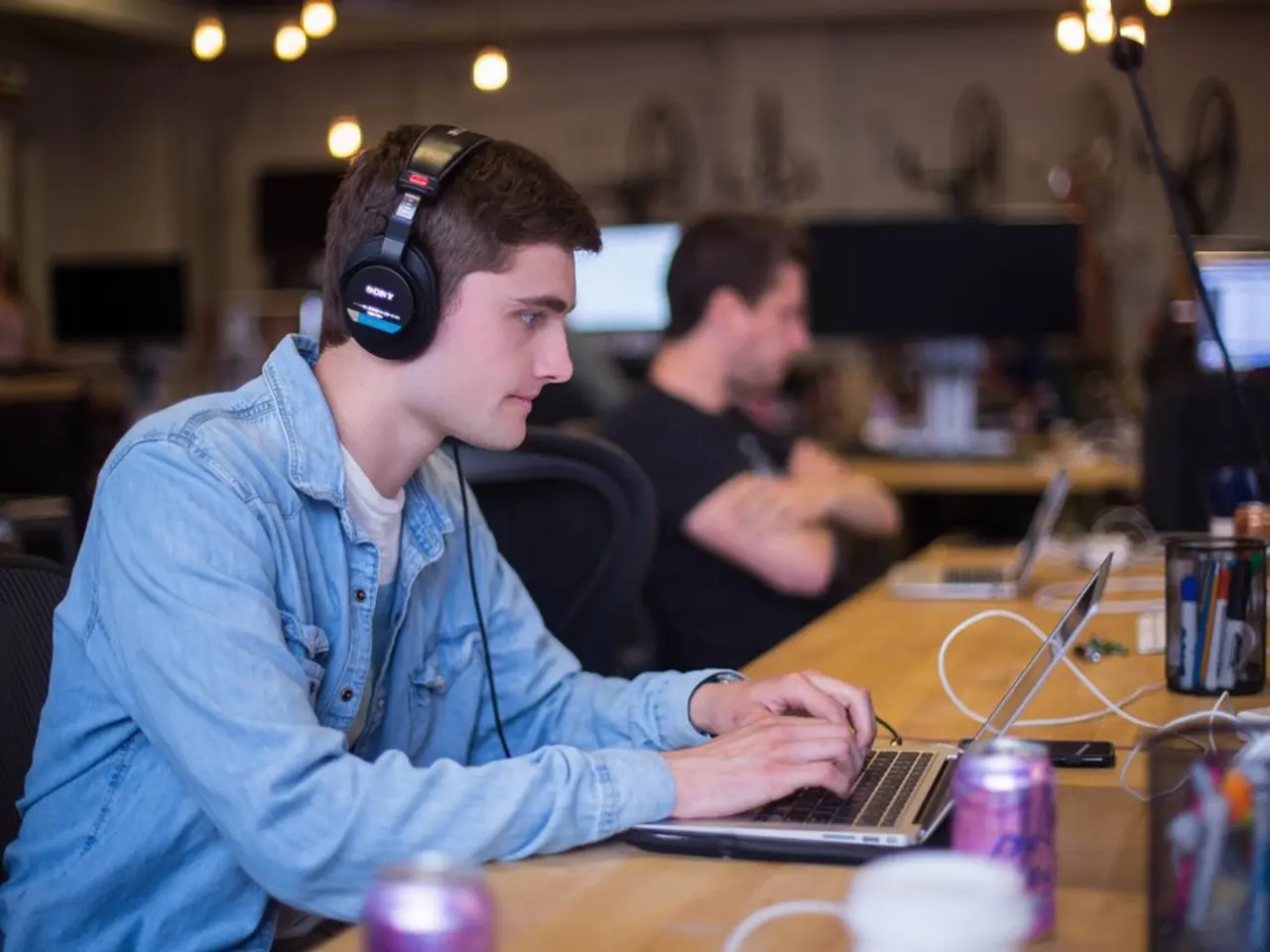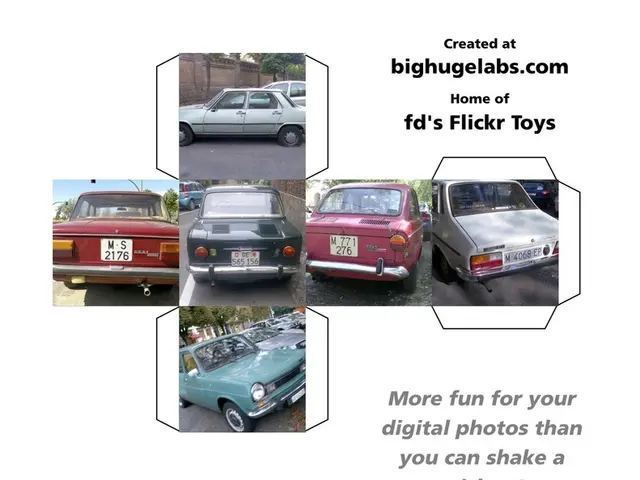Kandu Health consolidates its operations with neurotechnology firm Neurolutions from BCI sector.
In a groundbreaking development, the IpsiHand Upper Extremity Rehabilitation System, created by Neurolutions Inc., is set to transform the lives of stroke survivors[1][2]. This innovative brain-computer interface (BCI) device, licensed from Washington University in St. Louis, enables stroke patients to regain motor control of their hand and arm.
The IpsiHand system, consisting of a headset, a tablet computer, and a device worn over the hand and wrist, works by detecting brain signals and translating them into hand movements[1]. The active mental control promotes recovery of motor function in patients who have chronic difficulties moving their upper extremity after a stroke[1].
The IpsiHand has recently received FDA market authorization, making it the first FDA-approved BCI for rehabilitation purposes[1]. This milestone signifies the transition of BCI from experimental technology to a clinically available therapeutic device[1]. Moreover, the Centers for Medicare and Medicaid Services (CMS) has created a procedure code and made a benefit category determination for IpsiHand in 2024, enabling health insurance reimbursement for its use in clinical and home settings[1].
The device is designed for use either at home or in clinical environments, focusing on improving functional capabilities critical for daily living activities, such as feeding, grasping objects, and other purposeful hand and arm movements[1]. The IpsiHand specifically targets stroke survivors who have plateaued in spontaneous recovery (usually after six months), offering a novel rehabilitative option when traditional therapies have limited effect[1].
Post-authorization, the IpsiHand has garnered significant recognition, including being named a product of the year by California Life Sciences, highlighting its impact and innovation in the stroke recovery space[2]. The continued developments in BCI technology and growing patent landscape reflect a robust interest and investment in such neurotechnology, with IpsiHand at the forefront as a clinically validated and reimbursed device[3].
The merger between Kandu Health and Neurolutions continues the integration of IpsiHand into Kandu Health's stroke support services[4]. The combined company, operating as Kandu, will support patients from the immediate post-acute phase through chronic rehabilitation and recovery[4]. Kandu aims to lower the percentage of stroke survivors rating their quality of life as "poor or worse than death" one year after a stroke, which currently stands at 28% according to Kandu[5].
The $30 million investment from Ally Bridge Group and Amed Ventures will fund Kandu's commercial strategy, enabling the company to make IpsiHand available to eligible patients[6]. This investment will support Kandu's efforts to make IpsiHand a mainstay in stroke rehabilitation, improving outcomes for patients after hospital discharge[7].
In conclusion, the IpsiHand system represents a significant advancement in translating BCI technology into practical, widely accessible medical devices that assist patients in regaining motor function post-stroke through brain-controlled robotic assistance[1][2]. With FDA authorization, CMS reimbursement, and commercial availability, the IpsiHand is poised to revolutionize stroke rehabilitation.
References: [1] Neurolutions. (2022). IpsiHand: Brain-Computer Interface for Stroke Rehabilitation. Retrieved from https://neurolutionsinc.com/ipsihand/ [2] California Life Sciences. (2023). Product of the Year: IpsiHand. Retrieved from https://californialifesciences.org/product-of-the-year-ipsihand/ [3] Neurotechnology News. (2023). BCI Patent Landscape: A Growing Interest in Neurotechnology. Retrieved from https://neurotechnologynews.com/bci-patent-landscape-a-growing-interest-in-neurotechnology/ [4] Kandu Health. (2023). Kandu and Neurolutions Merge to Create Leading Stroke Support Services Provider. Retrieved from https://kanduhealth.com/press-releases/kandu-and-neurolutions-merge-to-create-leading-stroke-support-services-provider/ [5] Kandu. (2022). Kandu Health Launches to Improve Stroke Recovery Outcomes. Retrieved from https://kanduhealth.com/press-releases/kandu-health-launches-to-improve-stroke-recovery-outcomes/ [6] Business Wire. (2023). Kandu Health Announces $30 Million Investment to Fund Commercial Strategy. Retrieved from https://www.businesswire.com/news/home/20230307005373/en/Kandu-Health-Announces-30-Million-Investment-to-Fund-Commercial-Strategy [7] Neurolutions. (2021). FDA Grants De Novo Authorization for IpsiHand. Retrieved from https://neurolutionsinc.com/fda-grants-de-novo-authorization-for-ipsihand/
- The cybersecurity industry must ensure the safety of data and cloud computing in AI-enabled devices like the IpsiHand to prevent any potential breaches.
- Medtech advancements, such as the IpsiHand, are propelling the healthcare industry towards improved patient analytics and individualized therapies and treatments for chronic diseases.
- News outlets continuously cover the latest AI developments in the medical-conditions sector, highlighting breakthroughs such as the IpsiHand and its potential impact on fitness and exercise programs.
- The FDA and CMS collaboration for the approval of devices like the IpsiHand is a significant step towards making health-and-wellness technologies more accessible to patients.
- The library of scientific literature on artificial-intelligence applications in chronic diseases continues to grow, with the case studies of the IpsiHand serving as valuable resources.
- The fusion of technologies in the industry, such as M&A deals between Kandu Health and Neurolutions, aims to bring innovative solutions like the IpsiHand to market more expeditiously.
- CBD companies might analyze the trends surrounding devices like the IpsiHand and invest in research and development for treatments that complement rehabilitation therapies.
- With the FDA authorization and CMS reimbursement, the IpsiHand is set to disrupt the stroke rehabilitation market, offering a more comprehensive approach to patient care.
- TheCMD's decision to create a procedure code for the IpsiHand signifies a move towards integrating advanced technologies into traditional healthcare practices.
- The IpsiHand, a brain-computer interface for stroke rehabilitation, is redefining the landscape of personal medical-conditions management and wellness, particularly in the realm of fitness and exercise.
- The nutrition industry could explore potential collaborations with companies like Neurolutions to develop personalized meal plans that support neurorehabilitation, such as for stroke survivors using the IpsiHand.
- By integrating AI and IoT technology, the IpsiHand promises to revolutionize the remote monitoring and telemedicine capabilities for various health and wellness conditions, such as fitness and exercise programs.
- The success of the IpsiHand and other AI-enabled medical devices in the healthcare industry suggests a bright future for data-driven, personalized solutions, paving the way for continuous digital innovation in the health-and-wellness and medtech sectors.








